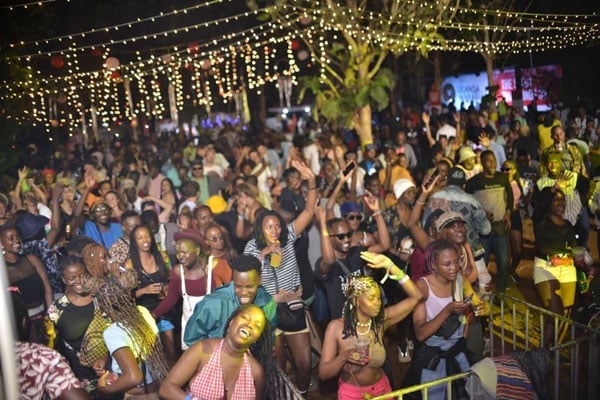Prime
Baikoko: Suggestive dance that typifies Nyege festival

Revellers at Nyege Nyege festival in 2023.
What you need to know:
- Despite being an arts festival, most cynics appear to have misunderstood the whole concept and most aspects of what could be Africa’s best underground music festival, writes Gabriel Buule.
It was in 2019 when Baikoko, an erotic dance, prompted mixed reactions after it was performed at the Nyege Nyege Festival. The dance traces its roots to the Tanzanian port city of Tanga. Sometimes mistaken to be some sort of modern taarab, the suggestive dance, which dominates nightlife in Tanzania’s financial hub of Dar es Salaam, originated from the Digo villages around Tanga in the early 1990s.
A blend of digo ngoma genres like gita, chera and mdindiko, the dance does not come out of the blue. No. It is an organised form of art with a troupe consisting of vocalists and instrumentalists. These largely depend on the ong msondo drum, the shakers, and the mabuyu—kind of trumpets originally made out of gourds.
The dance style is directly linked to the ngoma ya ndani, an exclusive women-only dance formerly only practised “inside” (as the name suggests). It is not intended to be visible to male eyes. Ngoma ya ndani is known among all the Mijikenda people down the Kenya coast from the Bajuni to the Digo. Elsewhere, it can be likened to msondo or unyago, part of the initiation of girls into adulthood.
According to Swahili Lab blog, Baikoko has recently become a staple of Dar es Salaam’s night entertainment offerings. Baikoko groups play in roadside bars, at weddings or being invited as an added attraction for modern taarab nights.
The group that started it all is Dogo Dogo Stars Baikoko, recently renamed Kaya Baikoko.
Baikoko was first seen in the Kisosora area of Tanga town and reportedly performed by a group called Bazoka. The instrumentation still stands the same but its face is being adapted to materials available in the city.
It is understood that the drums are now made from plastic drainage pipes of varying sizes; the maboya from buoys otherwise used to guide ships; and the rattles are made from empty tins.
It has been suggested that the name Baikoko derives from the fact that the dance was first seen in the Kisosora area of Tanga—kind of in the dark, close to the sea and the mikoko (mangrove forests).
However, the name really derives from the final song of mdindiko performances: Koko is the Digo equivalent to kokwa, the kernel of a fruit, the last thing to be eaten, bai translates as basi, the end, the final thing.
At this year’s Nyege Nyege festival that kicked off on Thursday and will run until Sunday, revellers are set to toast to Comorian art, probably Twarab, a Comorian version of the taarab genre of Zanzibar. There will also be a performance by the Banyaruguru troupe who will treat revellers to Ugandan traditional sounds, among others.
Last year, the festival was a toast to Burundis’ Burundi’s umurisho w’ingoma ritual dance and the Burundian Sacred Drum.
For the past editions, Busoga’s Tamenaibuga dance has been part of the festival as it demonstrates a sign of friendship and unity.
The festival is known for its diverse line-up of varying art forms and performers. It however gives a prime opportunity to African music and culture.
Themed around electronic music, some popular genres showcased at the festival include Afrobeat, Electronic boutiq, Afro-house, hip-life, traditional African music, Afro-fusion, among others.
Worth noting is that Nyege Nyege is a collective arts event that includes an artist residency and community studios with two record labels. These include Nyege Nyege tapes and Hakuna Kulala as an artist management agency and a legendary party crew called Boutiq electroniq.
Principally an electronic music festival, the music line up was again curated around artistes with electronic music across the globe.
Local performers will include Uganda’s grammy nominee Edrisa Musuuza, alias Eddy Kenzo, singer A pass alias Bagonza, vocalist Jemimah Sanyu, Janzi band, Karole Kasiita, among others.
According to Mixmag, a top British electronic dance and clubbing magazine, Nyege Nyege is a genuine, experimental African utopia—it feels like the future of festivals: excitingly diverse, consistently surprising and committed to uncontrollable dancing.
Background
Coined from a Luganda word, ekinyegenyege (uncontrollable urge), the festival came to life during the rainy season on October 15, 2015, in Njeru, Buikwe District. Its first edition took place at the Nile Discovery Resort in a chaotic event that saw revellers dance in the rain for three days.
The festival was founded by two friends, Arlen Dilsizian and Derek Debru.




